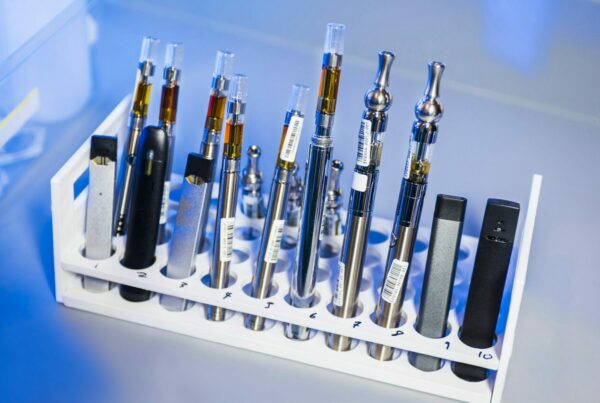N, N-Dimethyltryptamine (DMT) is a compound commonly found in both plants and animals, known for its intense yet short-lived psychedelic effects when ingested.
Emerging evidence implies that DMT, which naturally occurs in the body, plays crucial roles in both the peripheral and central nervous systems and could potentially function as a neurotransmitter.
DMT can trigger strong psychedelic experiences, however, it typically doesn’t result in many negative effects, apart from potential cardiovascular problems when administered in high doses via injection.
Let’s explore DMT and its diverse roles. These roles range from recreational usage to its promising potential in scientific research and therapeutic applications.

A Brief Outline of DMT: What Exactly Is It?
| Aspect | Details |
| Name | N, N-Dimethyltryptamine (DMT) |
| Classification | Indole alkaloid |
| Occurrence | Naturally present in a variety of plants and animals |
| Psychoactive Effects | Brief, intense psychedelic experiences upon ingestion. |
| Method of Consumption | Can be smoked, injected, or taken orally. |
| Duration of Effects | Short duration, typically between 5 to 30 minutes. |
| Chemical Structure | Comprises a tryptamine core with two methyl groups attached to the amine nitrogen atom. |
| Metabolism | Rapidly metabolized by the body, broken down by monoamine oxidase (MAO). |
| Cultural Use | Historically used in various ceremonial and shamanic rituals by indigenous cultures. |
| Other names | Dimitrifantasiabusinessman’s tripBusinessman’s special45-minute psychosisspiritual molecule |
The Importance of DMT in Mental Health
N, N-Dimethyltryptamine (DMT), a compound famous for its potent psychedelic effects, is garnering attention for its possible contributions to mental health. Although traditionally associated with inducing vivid visionary experiences, recent research suggests a connection between DMT and mental wellness.
Effect on Psychological and Emotional Personal Well-being
DMT’s psychedelic effects are renowned for eliciting profound emotional reactions and altering states of consciousness. This could potentially pave the way for innovative therapeutic methods to address mental health problems, assist in emotional processing, and offer new perspectives on personal traumas.
Neuroplasticity and Brain Functionality
Research suggests that DMT could influence neuroplasticity, thereby enhancing the brain’s ability to adapt and reorganize. Investigating its impact on synaptic plasticity and neural connectivity could provide potential treatments for conditions associated with neural dysregulation.
Potential Therapeutic Applications for Mental Health Conditions
Initial studies underline the potential of DMT in treating conditions such as depression, addiction, and PTSD. Its ability to induce mystical or spiritual experiences could offer a novel approach to psychotherapy and aid in restructuring negative thought processes.
Evaluating the natural presence of DMT within the body underscores its significance in maintaining mental health resilience, stress management, and overall psychological well-being. Understanding how the body controls internal DMT levels could lay the foundation for innovative therapeutic strategies.
The Role of DMT in Mental Health Conditions
| Mental Health Disorder | Description | Effectiveness of DMT | Potential Benefits |
| Depression | Defined as a mood disorder marked by persistent sadness, loss of interest, and reduced motivation | Preliminary research suggests DMT could alleviate symptoms by inducing deeply emotional experiences. | The rapid onset of DMT combined with its ability to provoke transformative experiences could provide novel therapeutic techniques for reshaping negative thought patterns and enhancing emotional processing. |
| Post-Traumatic Stress Disorder (PTSD) | A mental health disorder triggered by traumatic events, resulting in flashbacks, severe anxiety, and intrusive thoughts | Initial studies indicate DMT’s potential to manage symptoms by inducing spiritual or mystical experiences that could help patients restructure traumatic memories. | DMT’s potential to invoke altered states of consciousness could aid in facilitating emotional processing and offering a new perspective on traumatic experiences. |
| Addiction | A complex disorder characterized by compulsive engagement in rewarding stimuli despite negative consequences | Some research suggests DMT could disrupt addictive patterns and decrease cravings for substances. | DMT’s ability to provoke intense and transformative experiences could help individuals modify their behavioural patterns and address their addiction. |
Approach to Utilizing DMT
DMT, renowned for triggering short but potent psychedelic journeys, can be administered in multiple ways. The chosen mode of use often hinges on the desired intensity and duration of the trip.
Smoking:
When smoked through a pipe or vaporizer, DMT necessitates meticulous temperature control to prevent the substance from overheating and burning. The psychedelic journey commences almost instantly upon smoking DMT and typically lasts for a duration of 5 to 15 minutes.
Oral Intake:
Orally consuming DMT initiates slower effects that endure for a significantly lengthier period, often several hours. This is attributed to the slower metabolism of DMT when paired with an MAOI.
Injection:
Direct injection of DMT into the bloodstream leads to fast and powerful effects.
This approach prompts an immediate and robust experience, but it necessitates precise dosage and carries greater risks.
Insufflation (Snorting):
Snorting DMT results in a slower onset of effects compared to smoking, yet it might offer a more prolonged experience.
Sublingual or Buccal Administration:
Through absorption via the oral mucosa, this method presents an alternative to smoking and yields a longer, though less intense, experience.
Setting Therapeutic Dosage: N, N-Dimethyltryptamine (DMT)
For smoking, the recommended dosage lies between 20 to 40 mg, while for intravenous application, the suggested dosage is 0.2 to 0.4 mg per kg of body weight. These dosage recommendations are primarily pertinent to clinical research and are particularly relevant for intravenous application.
- Higher doses administered intravenously are associated with intense visuals, temporary loss of control, and a combined state of anxiety and euphoria
- Interestingly, lower doses have demonstrated less favourable effects
- Recreational doses of smoked DMT typically vary from 40 to 50 mg, occasionally even peaking at 100 mg
- Various doses of intravenous Users have reported that near-death experiences associated with DMT (in 7, 14, 18, and 20 mg solutions) have led to significant and lasting enhancements in their psychological health.
Availability of DMT
Osmosis – 4-ACO-DMT Ethereal Essence Tincture
This tincture is promoted to contain 4-Acetoxy-N, N-dimethyltryptamine (4-AcO-DMT), a derivative of DMT. Tinctures are liquid extracts designed for oral ingestion, and this particular product could offer a distinctive experience compared to traditional DMT.
Lucid Supply Co. – 5-MeO DMT Vaporizer
This product is a vaporizer that delivers 5-Methoxy-N, N-dimethyltryptamine (5-MeO-DMT). Recognized for its potent, transformative, and often short-lived experiences, 5-MeO-DMT is the active component.
Integral Alchemist – Acacia – 1ml DMT Vape Cartridge
The DMT vape cartridge from Integral Alchemist comes pre-loaded with N, N-Dimethyltryptamine. This product is likely designed for those who favor a compact and convenient method of DMT intake.
Deadhead Chemist – 5-Meo-DMT Cartridge
This cartridge houses 5-Methoxy-N, N-dimethyltryptamine (5-MeO-DMT), a compound known for its deeply impactful and intense effects.
Potential benefits to mental health may be associated with personal growth, spiritual experiences, or therapeutic applications intended to enhance emotional wellbeing.
Deadhead Chemist – N, N DMT Cartridge
This is a different offering from Deadhead Chemist, this cartridge is filled with the classic N, N-Dimethyltryptamine. Cartridges provide a user-friendly means of DMT consumption, facilitating a more controlled and consistent experience.
In Conclusion
The usage of N, N-Dimethyltryptamine (DMT) in
How can DMT be used responsibly?
Employing a mindful approach, understanding your mental health needs, and seeking guidance from trusted sources can contribute to responsible use.
Using DMT responsibly also includes considering the potential physical and psychological risks, as well as respecting the powerful nature of the experience.
Mental health therapy is a complex yet promising journey. The ability of certain compounds to induce intense yet fleeting psychedelic experiences opens the door to new therapeutic strategies.
Early research points to its potential role in emotional processing, personal growth, and possibly
The profound influence of mental health therapy requires careful consideration and responsible use.
If you’re interested in responsibly exploring DMT products, reliable sources like Powerful Magic Mushrooms Canada Online Dispensary can provide guidance and a variety of options.
Frequently Asked Questions:
How do different DMT products impact mental health?
For instance, vaporizers may produce rapid effects, whereas tinctures or vape cartridges can provide more controlled and consistent doses.
Using derivative compounds or 5-MeO-DMT can result in various intensity levels and distinct effects on mental health.
These nuances underline the importance of selecting a DMT product based on individual preferences and mental health goals.
Can DMT induce long-term changes in mental health and personal growth?
Some anecdotal evidence suggests that DMT-induced experiences could influence lasting changes in mental health and personal growth.
Highly impactful or transformative experiences, such as those resembling near-death experiences, are often associated with reports of sustained positive changes in psychological health and personal development.
Despite their intense and ephemeral nature, such experiences often lead to self-reflection, spiritual insights, and a sense of unity or enlightenment.
Following these experiences, individuals frequently report a refreshed perspective on life, improved emotional resilience, and an increased appreciation for life.
What’s the optimal strategy for using DMT for mental health?
Taking informed decisions, which involves extensive research and understanding of the compound’s effects, is paramount.
Advice from mental health professionals or experienced users can provide valuable insights into potential risks and rewards.
Recognizing personal tolerance and mental preparedness is also essential, as is ensuring a supportive and safe setting for the experience.
How is DMT different from other psychedelics like psilocybin or LSD in mental health therapy?
DMT’s effects, duration, and intensity vary from other psychedelics such as psilocybin or LSD. Its shorter duration leads to unique experiences.
These particular experiences from high-intensity, short-acting psychedelics demand unique therapeutic strategies in mental health, differing from those applied for longer-lasting psychedelics.
Recommended Additional Reading:





